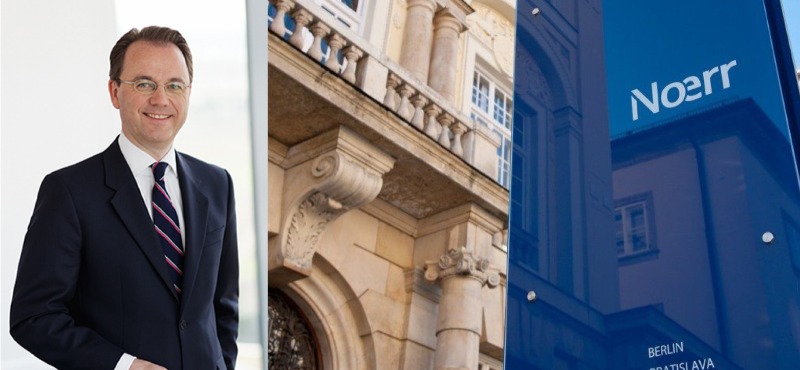This interview was conducted as part of the 2020 Edition of The Best Lawyers in Germany “Law Firm of the Year” award recognitions. Our partner Handelsblatt, also published these awards on June 27, 2019, online and in print in their June 2019 edition.
With new technologies come new risks—so, so many new risks to guard against. With all that risk, naturally, comes new insurance opportunities. Munich-based Noerr LLP was recently named the 2020 “Law Firm of the Year” in Germany for Insurance Law by its industry peers, and partner Thomas Heitzer—a 48-year-old who specializes in all manner of insurance and reinsurance litigation—sat down with Best Lawyers CEO Phillip Greer to talk about self-driving cars, the future of fraud, and the prospect of Alexa as your new insurance broker.
Your award indicates that your peers are saying you guys are on top of your game.
Thomas Heitzer: That’s very good to hear. In the end, it reflects strategic development to focus not only on work for the insurance industry but on being a full-service law firm. [We] offer not only transactional or litigation advice but also advice in IE, IT law, cyber, digitalization, employment law, antitrust law.
There’s often a lot of pressure on investment and financial firms to generate outsize returns, so they leverage themselves to the hilt. What steps do you take to protect those investments from downside risk?
Let me start with Germany. Under EU law, insurers are strictly bound when it comes to investment decisions. So, you don’t see insurers with hyper-leveraged positions. After the subprime crisis and the Lehman [Brothers] crisis, you’ve seen a narrowing of interest rates, which is critical for the insurance industry. This is one of the major threats at the moment. In the life insurance business, we’ve been advising two main groups in “death investing”—selling their licensures to specialized runoff entities funded by private-equity money. For example, ARAG, a German-leading legal protection insurer in Europe, sold entirely their shares in life insurance entities. Life insurers are bound by strict rules like how they are allowed to invest their capital. The disadvantage is that they have no opportunity to go into promising but riskier investments, which makes it hard for them to generate the contractually guaranteed returns.
Self-driving cars still appear to be a few years away. How does the insurance industry view these vehicles?
The obvious change is on the liability side: If I have a self-driving car, is the driver or the owner of the car liable in an accident or the manufacturer? Or the IT expert who created the program? In Germany, you have mandatory third party-liability insurance already in place. Then you have insurance coverage usually taken out for new cars, for damages, and then you have product liability for the manufacturer.
So, if you look at the full scope of insurance coverage already in place in Germany, one could say, “OK, there might be a shift. There might be a stronger liability for accidents due to a failure in the IT system.” And then one could argue, “OK, then that might necessitate an increase of the insurance sum, which is necessary when the manufacturer is liable.”
Supposedly self-driving cars are safer than a human driving. When it comes to the premium, one could say, “OK, fewer claims, damages, accidents. On the pro, this would lead to a reduction of premiums. However, on the negative side—and this is what [CEO Oliver Bäte] from Allianz has said: “Look, those cars are stuffed with IT, which is very costly in the event of an accident.” So, in the end, this is what our clients assume and expect: There will be no major change in insurance premiums only from self-driving cars.
With regard to cybersecurity and data privacy, how is insurance keeping up?
The EU has implemented strict regulatory regimes under which insurers are obliged to observe high cybersecurity standards. This is a sensitive issue, as you know from Facebook, Google, and all those companies, which face penalties in Europe.
On the second side—and this is more of a business opportunity for the insurance industry—around two or three years ago everyone talked about cybersecurity, cyber-insurance, cyber-protection. But had you asked any of the major insurance entities, “Have you taken out insurance coverage for cybersecurity?” they’d [say no]. Nowadays, after some attacks, this picture has totally changed.
Critical infrastructure is not only the financial industry, such as insurance and banks. Think of the energy supply: You have nuclear power plants. You have pipelines. You have hospitals. This is where the insurance industry jumps in to provide solutions.
Imagine a global banking institution is injected by some spam. This will have consequences for the customers, for the clients of the banks. This is a high risk when only one failure, one attack, goes through—such a massive risk for the insurance industry that it is quite difficult to assess. Some insurers are quite reluctant to take such major risks.
Insurance fraud is still a problem, but how people and companies conduct it is changing. What steps do you take to prepare your clients?
We have experience where we can say, “this is very strange from a logical or a life-experience perspective,” and we have corporations with special firms that provide investigation services. How can we prevent [fraud], and what are insurers doing, though? I see a lot of new technology in this area: With artificial intelligence, you can run huge amounts of data from the current claim to data from comparable claims. Such systems can identify whether this claim shows the correct signs for a claim of its kind. This is how insurers expect to deal with insurance fraud in the future. They’re armoring themselves up.
Do you see any of the major emerging technologies—blockchain, the internet of things, smart contracts, chat bots—as beneficial to the insurance industry?
Let’s take the perspective of the consumer. The new generation is growing up with iPad, iPhone—they do not want to see an insurance broker in their living room. The consumer expectation is “I want it quick, not much time, not much effort. I want to buy everything online.” However, insurance is a [legally complex] product. Under German and European law, insurers and brokers have to provide the client with tailor-made protection. This means you need some kind of interaction. We’re advising digital insurers already on chat bots—with Amazon’s Alexa, for example, there’s no human being intermediating the policy to the customers. It goes automatically. But it’s a very narrow line to meet regulatory requirements and issues like data and consumer protection. In the end, this might be a big challenge for the old insurers compared to the startups that can quickly set up an IT structure.
As you look ahead, are there any upcoming projects you’re especially excited about?
I’m looking forward to the rapid changes. This is a mega-trend for the insurance industry: Every day is challenging; every day you have to reinvent yourself. This is also what I look forward to for Noerr—making ourselves better every day in very demanding times.
This interview has been edited for length and clarity.
Reference: Insuring the Future
3,339 total views, 1 views today

